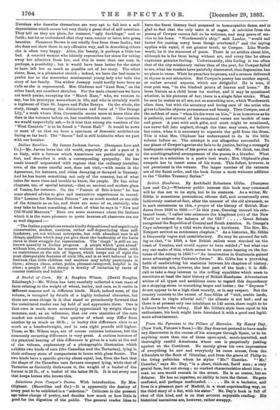Selections from Cowper's Poems. With Introduction. By Mrs. Oliphant. (Macmillan
and Co.)—It is apparently the destiny of every poet to be exhibited in a " selection." Criticism in the present age takes charge of poetry, and decides bow much or how little is good for the digestion of the public. The general reader likes to
have the finest literary food prepared in homceopathio doses, and is glad to find that the only taste is of sugar. A selection from the poems of Cowper cannot fail to be welcome, and may prove of ser. vice to his fame. " Wordsworth's ship," said Landor, " would sail better for casting many loose things overboard ;" and the saying applies with equal, if not greater truth, to Cowper. Like Words- worth, he is the sincerest of poets. There is no artifice about him, although he is far from being without art, and every line he utters expresses genuine feeling. Unfortunately, this feeling is too often that of the city missionary rather than of the poet, for Cowper failed to see, what his readers have painfully discovered, that dogmatism has no place in verse. When he preaches he proses, and a sermon delivered in rhyme is not attractive. But Cowper's poetry has another aspect, or rather several aspects, which are delightful. He is true, if ever poet was, " to the kindred points of heaven and home." He loves Nature as a child loves its mother, and it may be questioned whether, in his pictures of her, there is a single false stroke. What he sees he makes us all see, not as something new, which Wordsworth often does, but with the accuracy and loving care of the artist who gives to familar objects permanence and beauty. Then Cowper, one of the saddest of men " when his fits were on him," is as humorous as he is pathetic, and several of his occasional verses are models of ease and grace. A poet with such gifts, and more might be mentioned, can never fall into neglect, though the time may come, we believe has come, when it is necessary to separate the gold from the dross. This is what Mrs. Oliphant has endeavoured to do in the little volume before us. The attempt is not altogether successful. To one phase of Cowper's genius she fails to do justice, having a strangely inadequate conception of his power as a satirist. We think, too, that the autobiographical arrangement of the poems is a blander. What we want in a selection is a poet's best work ; Mrs. Oliphant's plan compels her to insert some of his worst. This defect, however, is not prominent in the volume. The larger number of the extracts are of the finest order, and the book forms a most welcome addition to the "Golden Treasury Series."


































 Previous page
Previous page